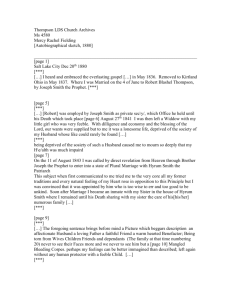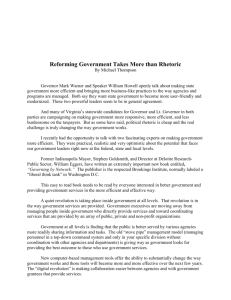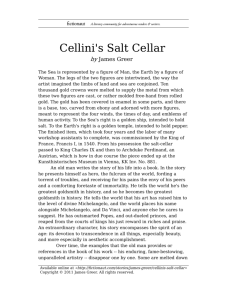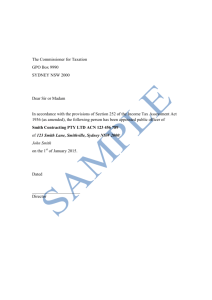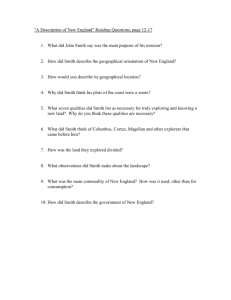Chapter 1: The changing business environment
advertisement
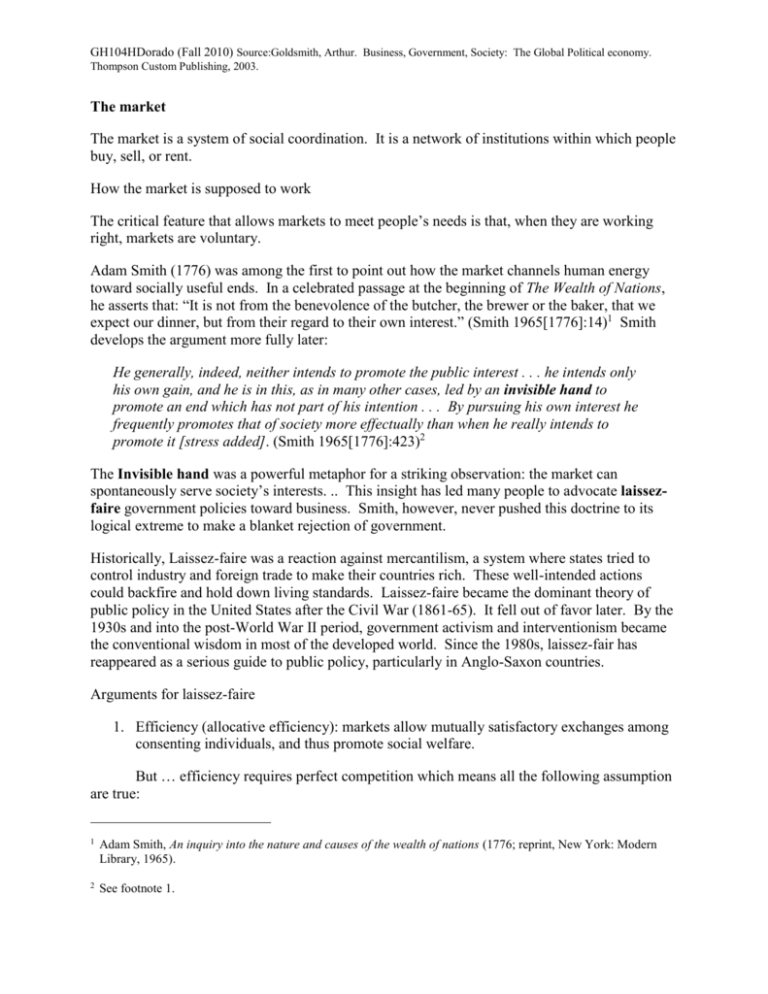
GH104HDorado (Fall 2010) Source:Goldsmith, Arthur. Business, Government, Society: The Global Political economy. Thompson Custom Publishing, 2003. The market The market is a system of social coordination. It is a network of institutions within which people buy, sell, or rent. How the market is supposed to work The critical feature that allows markets to meet people’s needs is that, when they are working right, markets are voluntary. Adam Smith (1776) was among the first to point out how the market channels human energy toward socially useful ends. In a celebrated passage at the beginning of The Wealth of Nations, he asserts that: “It is not from the benevolence of the butcher, the brewer or the baker, that we expect our dinner, but from their regard to their own interest.” (Smith 1965[1776]:14)1 Smith develops the argument more fully later: He generally, indeed, neither intends to promote the public interest . . . he intends only his own gain, and he is in this, as in many other cases, led by an invisible hand to promote an end which has not part of his intention . . . By pursuing his own interest he frequently promotes that of society more effectually than when he really intends to promote it [stress added]. (Smith 1965[1776]:423)2 The Invisible hand was a powerful metaphor for a striking observation: the market can spontaneously serve society’s interests. .. This insight has led many people to advocate laissezfaire government policies toward business. Smith, however, never pushed this doctrine to its logical extreme to make a blanket rejection of government. Historically, Laissez-faire was a reaction against mercantilism, a system where states tried to control industry and foreign trade to make their countries rich. These well-intended actions could backfire and hold down living standards. Laissez-faire became the dominant theory of public policy in the United States after the Civil War (1861-65). It fell out of favor later. By the 1930s and into the post-World War II period, government activism and interventionism became the conventional wisdom in most of the developed world. Since the 1980s, laissez-fair has reappeared as a serious guide to public policy, particularly in Anglo-Saxon countries. Arguments for laissez-faire 1. Efficiency (allocative efficiency): markets allow mutually satisfactory exchanges among consenting individuals, and thus promote social welfare. But … efficiency requires perfect competition which means all the following assumption are true: 1 Adam Smith, An inquiry into the nature and causes of the wealth of nations (1776; reprint, New York: Modern Library, 1965). 2 See footnote 1. GH104HDorado (Fall 2010) Source:Goldsmith, Arthur. Business, Government, Society: The Global Political economy. Thompson Custom Publishing, 2003. All firms are small and there are lots of them, so no buyer or seller can influence prices though independent action. Entering or leaving the market is easy. Consumers act to maximized utility, and firms act to maximize profits. Production technology has constant or decreasing returns to scale (The rate of output stays the same or falls as inputs are added) Buyers and sellers have full knowledge, available at no cost, about the performance and quality of items being traded. The offerings of sellers are identical in all respects. Prices of goods and services are not sticky and move up and down quickly, and they reflect full costs. Finally, the cost to penalize cheating by either party, and to protect their property, is zero. Market competition, it must be stressed, never produces the best possible distribution of resources—just the best distribution given the pattern of wealth and income. 2. Innovation: Markets force companies to innovate. 3. Liberty: Markets are desirable because they permit voluntary cooperation and are not binding. But . . . it depends on departing equality. . . The biggest inequality is often the gap between owners of capital and wage-earners. From this viewpoint, capitalism and democracy are contradictory. More over voluntary exchanges will not do for every social task. The United States is better off today for having forcibly freed slaves, whose owners were not paid for the property they lost. Market failure (table 2.2 of textbook) GH104HDorado (Fall 2010) Source:Goldsmith, Arthur. Business, Government, Society: The Global Political economy. Thompson Custom Publishing, 2003. Public goods: Markets do not provide education, public health services, infrastructure, and other public goods in ample quantity due to the problem of free riding. Example: Private companies may choose not to train their workers for fear they will lose any trained workers to competitors Externalities: Markets do not protect people from the actions of others. Example: second-hand smoke inflicts cost on non-smokers who had nothing to do with the purchase or sale of cigarettes. Monopoly: Due to obstacles to free entry, economies of scale, and other factors, markets may be dominated by one or a few companies that may try to take advantage of consumers. Example: Airlines charge very high fares in out-of-the-way communities where they face little competition. Information asymmetry: Markets cannot work well when consumers are ignorant. Example: lacking scientific knowledge, consumer can be enticed to buy dangerous patent medicines. Agent misdirection: Agents need not act in their principals’ best interest in a market. Example: brokers sometimes mislead elderly clients into making high-risk investments that are not appropriate for their investment goals. Social goals: Markets may not promote social goals, like providing merit goods. Example: Real estate developers do not build homes for the indigent. Inequality: Markets may be inequitable. Example: people with inherited wealth get to live extravagantly without working, while many hardworking people live in poverty. Economic instability: Markets may not provide full employment, stable prices, or economic growth. Example: The transition to a market economy in Russia is accompanied by a loss of jobs and a collapsing currency. GH104HDorado (Fall 2010) Source:Goldsmith, Arthur. Business, Government, Society: The Global Political economy. Thompson Custom Publishing, 2003. Roles of the state States are organizations that embody legal order within geographic territories. They are different from nations. A nation is a people who share a common language and culture. States defining characteristics is having sovereign control of territory.. As Max Weber (an eminent sociologist) has argued states possess a monopoly of legitimate force, business has no choice but to work with them. Roles taken by the state to correct market failure (table 3.2) Rule-maker: it makes the rules of the game of economic competition. Umpire: it resolves disputes over those rules. Buyer: it is a major market for private companies Producer: it produces public goods that help business, such as infrastructure and human capital, and also many privately-sold, individually-consumed goods and services, sometimes in competition with the private sector. Promoter: It promotes business through direct and indirect subsidies, on either a planned or ad hoc basis. Guarantor: It insures business and individuals against many types of risks. Broker: It is a middleman that brings companies and communities (including foreign countries) together. Regulator: It regulates many facets of business, such as safety standards, pollution standards, and employment practices. Economic manager: It uses macroeconomic policy to try to maintain full employment and stable prices. “Market failures are pervasive; it is only under exceptional circumstances that markets are efficient. The issue for the appropriate role of government is to identify the large market failures where there is scope for beneficial government intervention.” (Stiglitz, 1989:38).3 How states fail? A government failure is a miscarriage of public policy that has a net social cost. The failure is either one of commission or of omission. 3 Joseph Stiglitz. The economic role of the state (Oxford: Blackwell, 1989). GH104HDorado (Fall 2010) Source:Goldsmith, Arthur. Business, Government, Society: The Global Political economy. Thompson Custom Publishing, 2003. Rent-seeking behavior or attempts to exploit the state for private gain. How big is the cost to society? The estimates range from 3 to 25 percent of GNP. Special interest groups: Organized pressure groups work to take advantage of the unorganized. Inadequate feedback: Public employees are not given clear signals from their clients about how they are doing, and have little incentive to satisfy clients’ needs. Office seeking: Professional politicians are tempted to mislead of buy off constituents to win elections. Voting: Voters are poorly informed and apathetic. Unintended consequences: No one can accurately foresee the outcome of public policy
